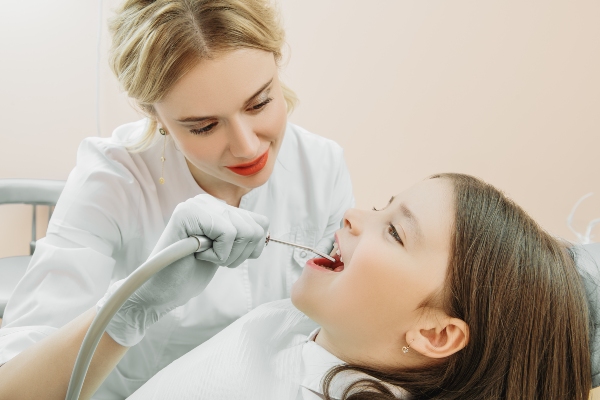 The right time to schedule a pediatric dentistry appointment for your child can vary based on a variety of factors. Routine professional cleanings and checkups are an essential part of good oral health for patients of all ages, including babies and children. You may be surprised to find out just how early the American Dental Association recommends starting routine appointments.
The right time to schedule a pediatric dentistry appointment for your child can vary based on a variety of factors. Routine professional cleanings and checkups are an essential part of good oral health for patients of all ages, including babies and children. You may be surprised to find out just how early the American Dental Association recommends starting routine appointments.
Timing pediatric dental visits
When in doubt, it is a good idea to contact your chosen pediatric dentist about what time is the right time for your child's very first checkup and any other appointments moving forward. Your child's pediatric physician may also make suggestions about when to start professional dental care.
The first appointment
Many parents think that dental care is not very important during infancy, as a child's diet consists primarily of milk for the first several months after birth. Also, baby teeth will not last forever, so there is an assumption that only permanent teeth need regular dental care. However, these views are incorrect; professional cleanings and checkups play a vital role in the future of a child's oral health, even at such a young age. The ADA recommends that parents take a child for their first pediatric dentistry visit within six months after the first tooth erupts, but no later than the age of 1.
Early dental appointments serve several purposes. First, they allow children to become acclimated to the ins and outs of a dental exam. These routine visits help kids feel more comfortable when a dentist or hygenist cleans and examines their teeth. They also allow dentists to remove tartar buildup, which leads to tooth decay. As soon as baby teeth come in, cavities can occur, even in children only a few months old.
Early checkups enable dentists to monitor the development of your child's teeth, gums, and bone structure while preventing and detecting issues early on. The sooner lifestyle changes are made or treatments begin, the better the chances of a more favorable outcome with less invasive dental work.
Routine checkups
Once your child sees a dentist for the first time, there is a good chance they will continue to do so once every six months. This is the standard schedule for both children and adults, and typical dental insurance plans cover two routine checkups per year. Research has shown that waiting much longer between cleanings increases the risks of tooth decay and gum disease, which children can be particularly prone to.
Patients with excellent dental health, no history of cavities, and no signs of potential issues may only need to be seen once a year. This is rare, though, and is a decision that should be made under the counsel of a dental professional. Pediatric dental visits should continue until age 12 or 13, or whenever all permanent teeth have come in. At this point, it will be time to transition your child to a regular dentist, although they can still be seen at a pediatric office for a few more years.
Conclusion
Regular pediatric dentistry checkups should begin early in life and continue on a regular basis. Your dentist can help you decide what timing is right for your individual child.
Request an appointment or call Jayne F. Scherrman JS Pediatric Dentistry at 573-271-3062 for an appointment in our Cape Girardeau office.
Related Posts
When your child has a dental emergency, a visit to a pediatric dentistry office is likely necessary. Most pediatric offices are well equipped to handle serious dental injuries. In fact, taking your child to see their regular dentist can be very beneficial. Your child can feel more at ease than they would in a new…
Pediatric dentistry is an essential part of a child's overall health regimen. Typically, a child should begin going to the dentist as soon as their first tooth comes in or when they are a year old. Taking a child to the dentist at an early age helps to instill good oral health habits that they…
Routine dental visits starting around age 1 are not only recommended; they are considered essential by many pediatric dentistry professionals. Regular cleanings and examinations are important for children once their first baby teeth erupt. These checkups significantly lower the risks for common dental issues while protecting your child from even bigger problems with tooth development…
